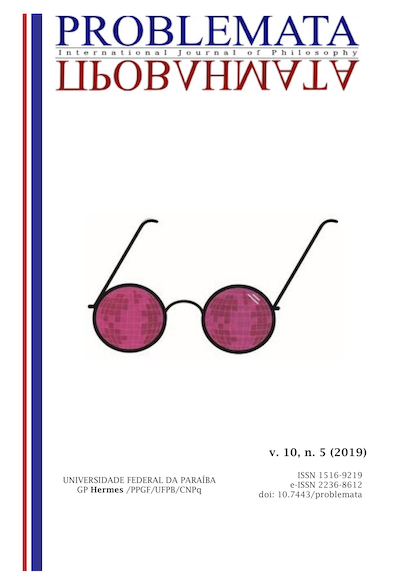BETWEEN SHARON STREET AND ADAM SMITH:
AN ANALYSIS OF THE EVOLUCIONARY INFLUENCE UNDER THE MODULATION OF THE FEELING OF SYMPATHY
DOI:
https://doi.org/10.7443/problemata.v10i5.46101Keywords:
Sympathy, Evolution, Moral, SentimentsAbstract
Considered the Archimedean point among politics, economics and morality in Adam Smith’s triad, sympathy will be analyzed from its possible evolutionary biological nature and metaethical implications. Based on this research, we will seek to propose to what extent this feeling may offer alternatives to solve global contemporary problems, such as: economic crises, wars and intolerance. For this, I will use the following works: Teoria dos Sentimentos Morais e Riqueza das Nações of Adam Smith, A darwinian dilemma for realist theories of value of Sharon Street, and O acaso e a Necessidade of Jacques Monod.
Downloads
References
BARAVALLE, “As muitas faces do altruísmo: pressões seletivas e grupos humanos”. Scientiæ Studia. São Paulo, v. 12, n. 1, p. 97-120, 2014.
BARD, K. “Neonatal imitation in chimpanzees (Pan troglodytes) tested with two paradigms”. Animal Cognition, 10, 233-242, 2007.
COSTA, T. A; BARBOSA, E. “A economia internacional como promotora do desenvolvimento humano a partir da releitura de Amartya Sen sobre a teoria de Adam Smith”. Conjectura: Filosofia E Educação 23 (2), p. 402-418, 2018.
FOGLE, T. “Are genes units of inheritance?”. Biology and Philosophy, v.5, 1990.
GUIMARÃES; MOREIRA. “O conceito sistêmico de gene – uma década depois”. Auto-organização: estudos interdisciplinares. Campinas: CLEUnicamp. v. 2, p. 248-80, 2000.
HUME, David. Treatise of Human Nature. Oxford: Oxford University Press, 2000.
______. “Of the Standard of Taste”. Essays, Moral, Political and Literary. Indianápolis: Liberty Fund., p. 227-249, 1987.
HUTCHESON, F. “Uma investigação sobre o bem e o mal do ponto de vista da moral”. Filosofia Moral Britânica: textos do século XVIII. Campinas: Ed. Unicamp, 1996.
______. An inquiry into the original of our ideas of beauty and virtue: in two treatises. Indianapolis: Liberty Fund, 2004.
KELLER, E. F. O século do gene. Belo Horizonte: Crisálida, 2002.
______. “The century beyond the gene”. Journal of Biosciences, 30, 1, p. 101-8, 2005.
LALAND, K.; BROWN. G. Sense and Nonsense: Evolutionary Perspectives on Human Behaviou. Oxford: Oxford University Press, 2002.
MONOD, J. Chance and Necessity. New York: Randon House, 1970.
MORROW, G.“The significance of the sympathy in Hume and Adam Smith”. Philosophical Review, n. 32, 1924.
______. The Ethical and Economic Theory of Adam Smith. Nova York: Longmans, Green and Co., 1969.
PORTIN, P. “The concept of the gene: short history and present status”. Quarterly Review of Biology, 56, p. 173-223, 1993.
PRESTON, S; WAAL, F. “Empathy: Its ultimate and proximate bases”. Behavioral and brain sciences. 25, p. 1–72. 2002.
RICHERSON, P; BOYD, R. Non di soli geni. Come la cultura ha trasformato l’evoluzione umana. Torino: Codice Edizioni, 2006.
ROSENBERG, A. Darwinism in philosophy, social science and policy. Cambridge: Cambridge University Press, 2000.
______. Darwinian reductionism, or, How to stop worrying and love molecular Biology. Chicago: The University of Chicago Press, 2006.
______. Philosophy of biology: a contemporary instroduction. New York: Routledge, 2008.
SANTILLI, E. “Níveis e unidades de seleção: pluralismo e seus desafios filosóficos”. Filosofia da Biologia. São Paulo: Editora Artmed, 2011.
SEN, Amartya. Adam Smith and the Contemporary World. Erasmus Journal for Philosophy and Economics, Volume 3, Issue 1, Spring, p. 50-67, 2010.
______. Adam Smith’s market never stood alone, 2009a. Disponível em: https://www.ft.com/content/8f2829fa-0daf-11de-8ea3-0000779fd2ac. Acesso em 28 de novembro de 2018.
______. Capitalism Beyond the crisis, 2009b. Disponível em: http://www.nybooks.com/articles/2009/03/26/capitalism-beyond-the-crisis/. Acesso em 04 de dezembro de 2018.
______. On ethics and economics. Oxford: Clarendon Press,1987.
SMITH, Adam. An Inquiry into the Nature and causes of the wealth of nations. Chicago: The University of Chicago Press, 1776.
_____. O Inquérito sobre a natureza e as causas da Riqueza das Nações. Lisboa: Fundação Calouste Gulbenkian, 2014.
______. Teoria dos Sentimentos Morais. São Paulo: Wmf Martins Fontes, 1999.
______. The theory of Moral Sentiments. Cambridge: Cambridge University Press, 1759.
SOBER, E.; WILSON, D. S. “El comportamiento altruísta”. Evolución y psicología, Madrid: Siglo Veintiuno, 2000.
STANFORD ENCYCLOPEDIA. 2018. Disponível em: https://plato.stanford.edu/entries/morality-biology/. Acesso em 11 de dezembro de 2018.
STOCKER. Adam Smith, the city, natural order, republicanism. Disponível em: <http://istanbulfactsandideas.blogspot.com.br/2009/08/adam-smith-city-natural-order.html>. Acesso em 25 de julho de 2018.
STREET, Sharon. “A darwinian dilemma for realist theories of value”. Philosophical Studies V. 127 (1), p.109-166, 2006.
TAVORY, I.; GINSBURG, S.; JABLONKA, E. “The Reproduction of the Social”. Developing Scaffolds in Evolution, Culture, and Cognition. Cambridge: MIT Press Scholarship Online, 2013.
UNITED STATE OF AMERICA. Human Genoma Project Informatio Archive http://www.ornl.gov/sci/techresources/Human_Genome/glossary/glossary_g.shtml. Acesso em 01 de novembro de 2018.
VENTER. C. “The sequence of the human genome”. Science, 291, p. 1305-51, 2001.
WILLIAMS, G. Adaptation and Natural Selection: a critique of some current evolutionary thought. Princenton: Princenton University Press, 1966.
Downloads
Published
Issue
Section
License
Authors who publish with this journal agree to the following terms:
- Authors retain copyright and grant the journal right of first publication with the work simultaneously licensed under a Creative Commons Attribution License that allows others to share the work with an acknowledgement of the work's authorship and initial publication in this journal.
- Authors are able to enter into separate, additional contractual arrangements for the non-exclusive distribution of the journal's published version of the work (e.g., post it to an institutional repository or publish it in a book), with an acknowledgement of its initial publication in this journal.
-
- Authors are permitted and encouraged to post their work online (e.g., in institutional repositories or on their website) prior to and during the submission process, as it can lead to productive exchanges, as well as earlier and greater citation of published work (See The Effect of Open Access).





